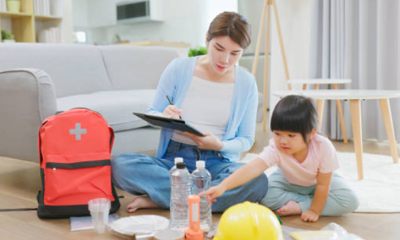
Having a family preparedness plan is essential for handling emergencies. Being prepared for disasters can make a world of difference in safety and peace of mind. However, common mistakes can render these efforts ineffective. In this article, we will explain how you can get your family ready for emergencies by creating a plan that works.
Understanding Risks
Understand the types of disasters that may affect you. Natural disasters like floods, earthquakes, hurricanes, and wildfires are among the threats your area may face. Families can then decide which precautions to take. Investigate the history of natural disasters in your area and talk to the authorities about the most probable scenarios.
Creating a Communication Plan
Effective communication is crucial in any emergency situation. A robust family disaster preparedness plan ensures everyone can communicate with one another. Choose a location to meet, and agree on how to get there. Having a point of contact who is out of town is also a smart move. In case local lines go down, they look for and provide information.
Building an Emergency Kit
An emergency kit is a cornerstone of preparedness. There should be basic stuff like water, non-perishable food products, and essential medical supplies in this package. Flashlights, extra batteries, and a manual can opener will also be useful. Pack what you need personally, such as medicines and hygiene products. Check and update this kit regularly to make sure everything works and nothing has expired.
Planning for Special Needs
Because every family is different, plans should be made differently. Keep in mind any needs that people may have. For example, infants might require formula, or elderly family members might not be able to walk as fast as others. You should also think about your pets. Collect pet food, water, and medicines. Make sure everyone is covered during a crisis by customizing the plan to suit these needs.
Practicing the Plan
Having a plan is one thing; executing the plan is another. Run drills so you all know how and where to position yourselves. These exercises ensure all gaps or misinterpretations are identified. Adjust the plan to address these issues. Rehearsing is also useful for reducing panic when a disaster occurs because family members will know what to do.
Staying Informed
In emergencies, information is power. Get your information from trusted sources, such as local news channels and government notifications. Think about buying a radio that is powered by a battery or a hand crank. It can help you communicate during power and internet outages. Keeping families in the loop aids informed, expedient safety decisions.
Financial Preparedness
Disasters often bring unexpected expenses, so having emergency funds set aside can help. Hold petty cash, especially since electronic money transfers may not be feasible. Keep important documents, like insurance policies and identification documents, safe but readily accessible. For additional safety, create additional digital copies on an encrypted cloud service.
Community Involvement
Preparedness is not limited to just the family level. Engaging with the local community can provide a sense of safety. Many neighborhoods have groups dedicated to disaster preparedness. You can join these groups to access shared resources and support systems. Your neighbors can provide a much stronger response in an emergency with the expertise of your collaboration.
Avoiding Common Pitfalls
Some errors can reduce the effectiveness of your plan. One common error is procrastination. You should plan in advance rather than wait until something becomes dangerous. Failing to update both the plan and the supplies is another error. Family needs and risks change, so plans should as well. Finally, avoid complacency. Though disaster has not yet struck, there remains the potential for an emergency.
Disaster preparedness needs intentional and periodic practice. Knowing the risks, communicating, and having supplies ready means no one has to feel scared or panic during an emergency. Involving the community and being financially prepared are additional measures that fortify these actions. By avoiding some of the common pitfalls, you can ensure your plan remains relevant and effective. These strategies will allow families to protect their loved ones.



(0) comments
We welcome your comments
Log In
Post a comment as Guest
Keep it Clean. Please avoid obscene, vulgar, lewd, racist or sexually-oriented language.
PLEASE TURN OFF YOUR CAPS LOCK.
Don't Threaten. Threats of harming another person will not be tolerated.
Be Truthful. Don't knowingly lie about anyone or anything.
Be Nice. No racism, sexism or any sort of -ism that is degrading to another person.
Be Proactive. Use the 'Report' link on each comment to let us know of abusive posts.
Share with Us. We'd love to hear eyewitness accounts, the history behind an article.